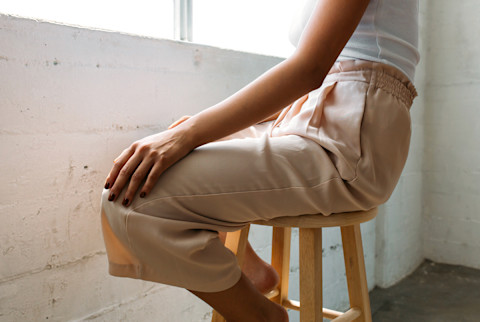I'm A Manual Therapist & This Is Actually How To Sit Properly (It's Not So Simple!)

Picture this: You're lounging on the couch or in a chair when, all of a sudden, someone brings up the topic of posture. Maybe in that moment you realize you aren't quite sitting up straight and shift your position.
It's so easy to fall into habitual manners of sitting, and those little reminders can be helpful. But what, exactly, does a proper sitting posture look like?
When manual therapist and movement coach Aaron Alexander joined us on the mindbodygreen podcast, he shared the details on how to actually sit properly—it turns out, there are a few more things to keep in mind than we thought. Below, find all of his recommendations.
How to master a healthy sitting posture
According to a concept called postural theory1, how we physically hold ourselves can influence how we feel. It makes sense, then, that you might want to optimize the way that you sit (you can read more about how your posture affects your mood here).
Per Alexander, sitting in a chair isn't as simple as plopping yourself down: "Make sure that your hips are above the height of your knees when you're sitting in any position. What that will do is naturally put your lower back and your pelvis into an architectural position of integrity, support, and load-bearing. Drive weight through the shoulders, and [you will] comfortably stack through that neutral spine."
In addition to the hips and knees, Alexander emphasizes the importance of getting to know your sitz bones (he calls them "the feet of your butt"), which are located at the base of the pelvis. "Load weight in a mechanically effective way," he explains. "Have a slight tilt forward—not too much to the point where you're in hyperlordotic territory [aka, when your spine has an inward curve]—and allow the ribs to tuck down toward the pelvis a little bit while you maintain that position."
Once you've become a bit more mindful of your hips, knees, and sitz bones, the next step is to practice some rounds of nasal breathing: "[Place] your hands on the low ribs, and just notice the breath [flowing] through the nose," he says. "Just by doing that, you're getting access to much more air."
Finally, Alexander offers a helpful visualization technique while you sit and breathe: "Imagine there's a little string in the back of your head, slowly drawing your head up toward the ceiling. Use your visual muscles and look up as opposed to looking down all the time."
Looking up supercharges the senses. "It's sending the signal that it's time to wake up, time to get creative, time to come up with ideas," he notes.
The takeaway
According to Alexander, the proper way to sit involves keeping the knees below the hips, tilting slightly forward on the sitz bones, and engaging mindful nasal breathing. It may sound simple, but it can have profound effects on your mood and overall energy.
